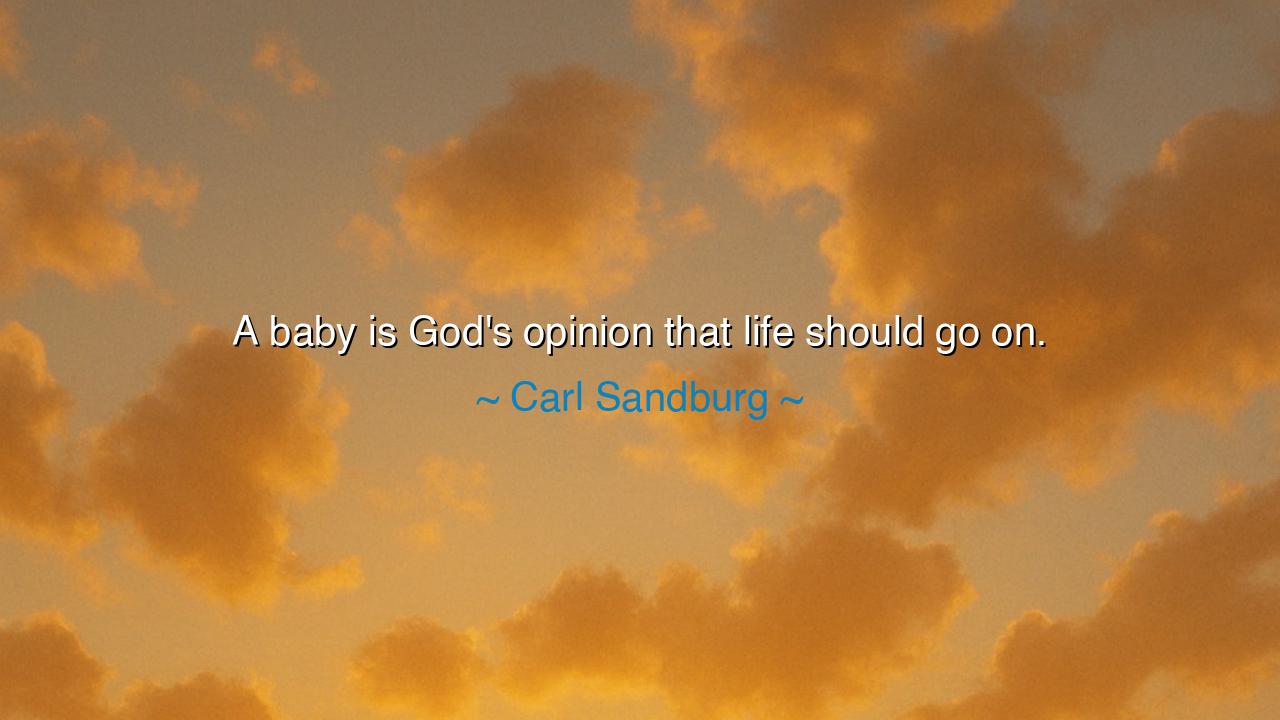
A baby is God's opinion that life should go on.






The poet Carl Sandburg once offered a meditation upon the miracle of existence when he said: “A baby is God’s opinion that life should go on.” In these words lies a truth as tender as it is profound: the birth of a child is not merely a biological event, but a cosmic statement—a whisper from eternity that hope endures, that the journey of life continues, and that the human spirit, despite trials and sorrows, is worthy of renewal. Sandburg, who wrote of cities, rivers, and the lives of common people, distilled the eternal mystery of life into a single, luminous phrase, reminding us that in every newborn rests the voice of the divine.
To grasp the depth of this saying, one must see it as both philosophical and spiritual. A baby is fragile, dependent, yet brimming with potential. It is in the vulnerability and innocence of the child that the divine affirms creation. Sandburg implies that life itself is sacred, and each new life is a vote cast by God in favor of existence. In the tiny heartbeat of an infant, the universe murmurs: continue, endure, love, and grow. Every birth is a testament to resilience, to hope rekindled even in a world scarred by grief and struggle.
History, too, offers poignant illustrations of this truth. During the darkest days of World War II, amidst bombed cities and shattered lives, children were born into chaos. Yet their cries, fragile and resolute, reminded humanity that life persists even in despair. One such child, Anne Frank, though her life was tragically cut short, became a symbol of hope through her diary, a testament to the human will to endure. In her very existence, she embodied Sandburg’s insight: that a baby carries within it the affirmation of life and the promise of continuity.
Sandburg’s words also speak to the cyclical nature of human endeavor. Civilizations rise and fall, empires are forged and destroyed, and yet the birth of a child reminds us that the story of humanity continues, generation by generation. In ancient times, the Greeks and Egyptians revered children not only as heirs but as symbols of immortality, vessels through which culture, wisdom, and spirit endure. To witness a newborn is to glimpse the bridge between the finite and the eternal, the fleeting and the everlasting. Life asserts itself anew in every infant.
The emotional resonance of this quote lies in its simplicity and universality. A baby embodies hope, potential, and the unspoken promise that even in the face of suffering, existence is meaningful. Every tiny breath, every first smile, every grasp of a tiny hand is a sacred declaration: life matters, and the world is worthy of care and love. Sandburg reminds us to honor the miracle inherent in birth, to see not only the fragility of a child but the grandeur of the life it represents.
This teaching extends beyond mere observation into action. The presence of a newborn calls for protection, guidance, and nurturing. It compels us to value life, to foster compassion, and to ensure that the world we bequeath is worthy of the next generation. In every act of care toward a child, we participate in the affirmation Sandburg described. We echo the divine vote that life should continue, transforming passive awe into active stewardship.
In practical terms, the lesson is both humble and profound: cherish children, honor life, and act as guardians of hope. Support those who nurture the young, protect the vulnerable, and teach kindness and wisdom to the next generation. Every choice made in favor of life, in defense of innocence, and in cultivation of potential becomes an act aligned with the affirmation Sandburg so eloquently expressed.
Thus, across the corridors of time, Sandburg’s words endure: “A baby is God’s opinion that life should go on.” Let them remind us that each new life is sacred, a covenant between humanity and the divine, and a challenge to rise to the responsibility of nurturing, protecting, and celebrating existence itself. In every child, the eternal declares: life is precious, hope persists, and the story continues.






AAdministratorAdministrator
Welcome, honored guests. Please leave a comment, we will respond soon